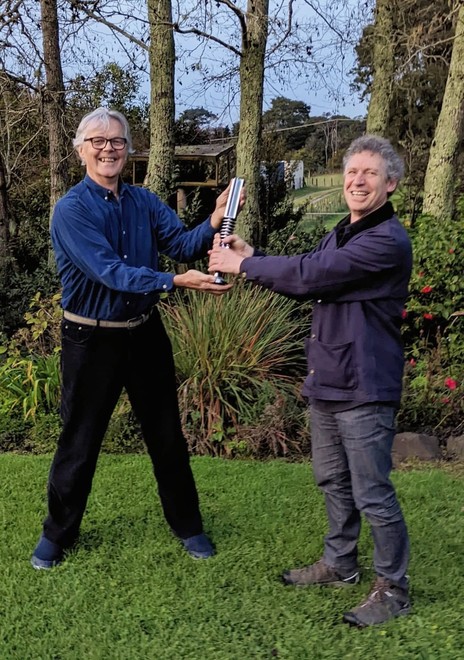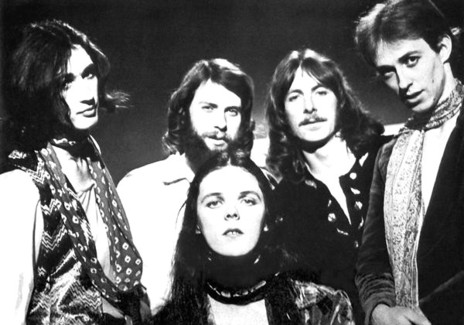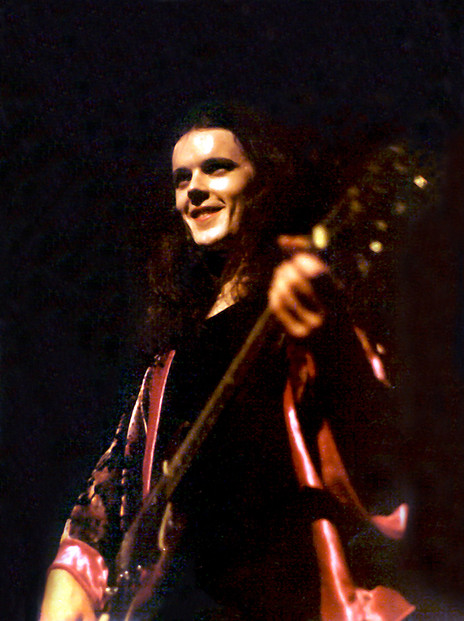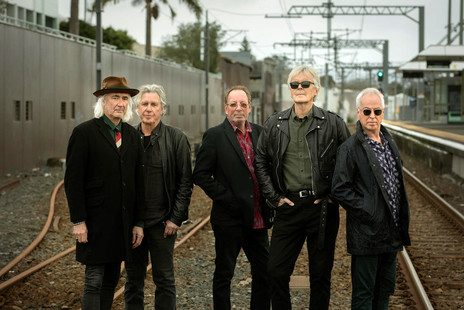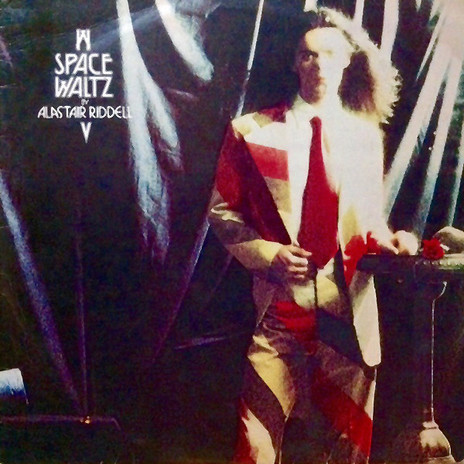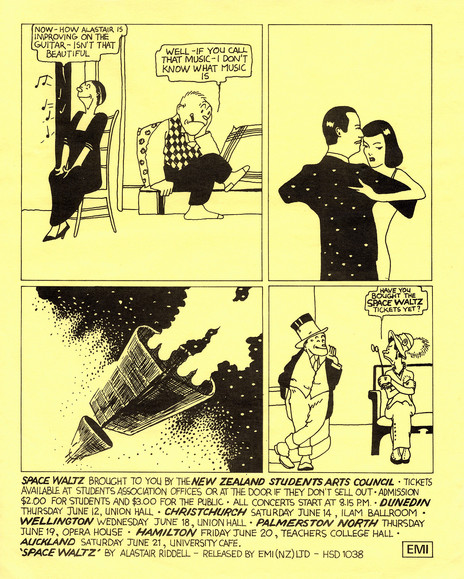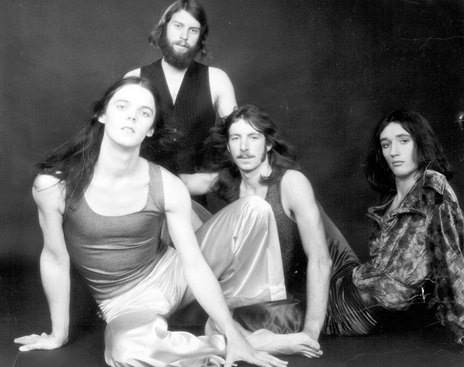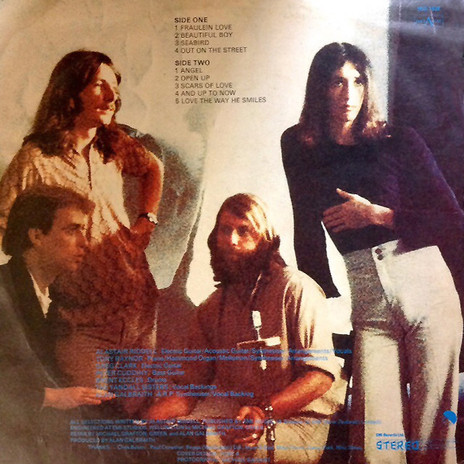Throughout the song – which was perfectly timed for pop music, at three minutes on the dot – Alastair Riddell looked straight down the camera, breaking the fourth wall. Watching at home, every pair of eyes in the country grew wide and remained firmly focused upon Riddell. They were confronted by a flamboyantly dressed glam-esque rocker who primped, preened, strutted, posed, and (in the terminology of the day) gender-bended with a performative style never before seen from a local lad. More akin to the theatrical performance style of Marc Bolan (T Rex) and David Bowie (in his Ziggy Stardust era), this was a culture-shock moment in the extreme. Truly, things would never be the same.
“Outrageous!” screamed older viewers at their black and white television sets, while others muttered darkly into their cups of tea yet found themselves shamefacedly unable to look away. “Pretentious!” screamed others.
“Portentous”, however, is the apt word. To the younger generation of New Zealanders who were entranced, excited and mobilised rather than threatened by this in-yer-face shock of the new, a far more common response was an incredulous, “How can I see this band again! Where can I buy that song!”
In Riddell’s own words, “The adults and the parents were shocked and appalled. They were shocked by this sexually ambiguous thing – this image – that came on their screens that was very powerful and all the kids thought it was fantastic! All the younger people thought it was amazing and it had a polarizing effect.”
In a flash, record company giant EMI pounced upon the youth groundswell.
In a flash, record company giant EMI pounced upon this youth groundswell and, before Studio One/New Faces had even run its course, Space Waltz found themselves clutching a record contract and standing before studio microphones. Or, more precisely, it was Riddell clutching the record contract as it turned out that EMI’s primary interest lay rather divisively in him rather than in the full band.
The Studio One/New Faces judging panel of Phil Warren, Howard Morrison, Paddy O’Donnell and Nick Karavias directed towards the band a squirming mix of sarcasm, homophobia, grudging respect, and at times outright derision. The notable exception was Warren, who recognised Space Waltz’s immense teen appeal immediately. Karavias – ironically an HMV producer (The Avengers) – called their performance, “A splendid example of what I would call ‘obnoxious rock’.”
However, such was the enthusiasm of the younger members of the studio audience in their response to ‘Out On The Street’, Space Waltz found themselves propelled into the final of this most middle-of-the-road televised talent quest; a bizarre sight/phenomenon to behold.
With the world seemingly at Space Waltz’s feet, the hastily recorded ‘Out On The Street’ duly hit No.1 – displacing Eric Clapton’s ‘I Shot the Sherriff’, and the first local No.1 hit for four years – and all in all spent 10 weeks on the New Zealand singles chart. Seemingly, things could not have looked brighter for Riddell (lead singer, songwriter and guitarist), Greg Clark (guitar), Tony Rayner (keyboards), Peter Cuddihy (bass) and Brent Eccles (drums).
The fact that they would ultimately bomb out in the final of Studio One/New Faces mattered not a bit, as the show had already served its admirable purpose in providing the means for Riddell and co to strut their stuff before the nation’s youth. Performing a new song with the aptly provocative title of ‘Beautiful Boy’ they were accused by the judges after their finals performance of having not “moved on” from their effort in the preceding heat.
But in truth Space Waltz could never have won the final, regardless of what they did. There was far too much of a round-peg-in-a-square-hole scenario going on for that to happen, and the miracle of their progression through the programme had already passed.
But in truth Space Waltz could never have won the final, regardless of what they did.
Despite the undeniably impressive talents of the other band members – all of whom would go on to further accolades in various other lineups – Space Waltz was above all a vehicle for the prodigiously talented and highly intelligent Alastair Riddell. Even as the band was appearing on Studio One/New Faces he mused in an interview with Hot Licks magazine, “I’ve developed my style independent of a group so I can arrange and produce it on my own and run the whole thing ... It may appear fairly egotistical but that’s the only way now I can make it work.”
The group of musicians that Riddell chose to collectively assemble under the Space Waltz name for the Studio One/New Faces experiment in 1974 were already his bandmates and proven allies in another guise. Since 1973 they had performed together in the pubs and clubs of Auckland and the Waikato region as the money-making/ bill-paying covers band Stewart & the Belmonts. (And, even preceding this, Riddell and Rayner had performed together in a progressive Auckland University band, Orb, which disbanded after their performance at the now legendary Great Ngāruawāhia Music Festival in 1973.)
Wanting to take their music in an original direction, Stewart & the Belmonts adopted a new name – an alter ego – for the far artier endeavours imagined and penned by the highly driven Riddell. Thus Space Waltz was born. Studio One/New Faces was identified as a somewhat obtuse yet highly visible publicity vehicle.
And why not? After all, the same tactic had worked for Shona Laing in 1972, and for Bulldogs Allstar Goodtime Band and also Split Ends (prior to the name change to the trendier Enz) in 1973. For Space Waltz, an unlikely fit at best, successfully auditioning for Studio One/New Faces was always a means to an end. And it worked very well, meteorically elevating the band to household name status.
Following a successful nationwide tour in late 1974, Space Waltz started 1975 just as triumphantly when they were awarded the highly coveted RATA (Recorded Arts Talent Award) in the best new artist category. In January the band recorded and mixed a full album’s worth of material for EMI with producer Alan Galbraith. While the band got on well personally with Galbraith, Riddell recalls the overall experience as being less than harmonious, with EMI expressing their displeasure at the length of time the recording was taking.
Riddell was unhappy with the finished album, but his request for a remix was denied.
Once completed, Riddell was unhappy with the finished album. Nevertheless his request for a remix was denied and the suggestion was even made that the master tapes had already been erased: a point that to this day remains contentious between the various parties. Somewhat confusingly the album was titled Space Waltz by Alastair Riddell, something that led to “are-they-a-band-or-a-solo-act?” kind of speculation, but also clearly reflective of EMI’s decision to sign Riddell and not the full band.
To promote the album’s subsequent launch in May a second single, ‘Fraulein Love’ was released. Equally as hard-hitting, catchy and futuristic as its smash hit predecessor, and although attaining an otherwise respectable No.20 placing on the singles chart, the performance of ‘Fraulein Love’ was clearly a disappointment given the extraordinary heights attained by its forerunner.
With relations now extremely poor between Riddell and his record company, EMI refused to sponsor a promotional tour. Although the band went ahead and organised their own tour with sponsorship from Radio New Zealand, it failed to match the success of their first and ultimately ended in a loss of $32,000. Further acrimony ensued when Radio New Zealand unsuccessfully attempted to recover this shortfall from Riddell himself. In June a third tour was undertaken but, despite the support of the Students Arts Council, this too proved a failure. Although nobody yet knew it, this succession of events signalled the beginning of the end for Space Waltz.
In October 1975 the band moved to Melbourne. This line-up contained two personnel changes, with Paul Baeyertz replacing Tony Rayner on keyboards – the latter having committed to Split Enz fulltime as Eddie Rayner – and Dave Walker replacing Greg Clark on guitar.
The band’s initial hope that EMI Australia would release the album there proved unfounded, but hopes for establishing themselves across the Tasman were somewhat rekindled when Michael Gudinski of Mushroom Records signed them to a management deal.
Simultaneously, however, up-and-coming promoter Mike Browning, whom Riddell had previously approached, stated his desire to take Space Waltz to London along with another up-and-coming Australian band called AC/DC. Against Riddell’s wishes the band elected to stay in Melbourne in the hope that the Mushroom deal would pay greater dividends. It did not, however, ultimately resulting in no recording at all nor even a single gig.
In December 1975, with no prospects in sight, all members except Riddell quit the band.
In December 1975, with no prospects in sight, all members except Riddell quit the band and returned to New Zealand. Brent Eccles and Peter Cuddihy joined Street Talk in April 1977; in late 1977 Eccles and Greg Clark joined the Chunn brothers Geoff and Mike to form Citizen Band. Eccles would go on to join Australian rock band The Angels in 1981, eventually returning to New Zealand to establish a successful tour promotion company, Eccles Entertainment.
Riddell optimistically remained in Australia for another three months but by now Mushroom had completely lost interest. So, in March 1976, he too returned home only to find EMI NZ equally disinterested in their star signing. In total the entire Space Waltz experience had lasted just 15 months.
The Space Waltz story is one suffused with a significant dollop of what-might-have-been. Regardless, and notwithstanding the tensions surrounding the “band-or-solo-act?” conundrum that has never conclusively been resolved, there has never been a New Zealand rock act that achieved so much within such a short existence. New Zealand’s rock history is much the richer for their efforts.
--
Footnote: Space Waltz re-formed in 2021 and have been recording once again. Remarkably incorporating all of the original members, they were billed to perform their first live performance in 46 years at the Mercury Theatre, Auckland, as part of The Other’s Way festival. However, the gig was canceeled due to the Covid-19 pandemic. In March 2022 Space Waltz released their first song since the 1970s: ‘Hypnotise Me’ has all the hallmarks of a Space Waltz classic.
